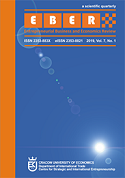An investigation of the nexus between globalisation dimensions and income inequality
An investigation of the nexus between globalisation dimensions and income inequality
Author(s): Zita Tamašauskienė, Skaidrė ŽičkienėSubject(s): Geography, Regional studies, Supranational / Global Economy, Evaluation research, Economic development, EU-Approach / EU-Accession / EU-Development, Globalization
Published by: Uniwersytet Ekonomiczny w Krakowie
Keywords: globalisation; dimensions of globalisation; income inequality; panel data; European Union;
Summary/Abstract: Objective: The objective of the article is to explore the nexus between changes of various globalisation dimensions, defined by either policy (de jure) or outcomes (de facto), and the rise in income inequality in a panel of 27 EU countries during the period 1998-2017. Research Design & Methods: In order to tackle endogeneity issues, the effect is empirically tested applying the appropriate one-step system generalised method of moments (GMM) technique. Globalisation is measured by the de jure and de facto trade, financial, social, and political KOF globalisation indexes. Income inequality is measured by net Gini. To examine the sensitivity of our findings, we apply the decile ratio and quintile ratio as dependent variables. Findings: We have found several significant results. First, de jure trade and de jure financial globalisation exert a big affirmative influence on income inequality and suggest that changes in trade and financial policy have increased inequality in the EU countries. Second, the results testify that de jure and de facto political globalisation influence income inequality in various ways and opposing directions. Finally, the effect of social globalisation on income inequality lacks statistical significance. Implications & Recommendations: De jure trade and financial globalisation measures which are based on tariffs, trade taxes, trade and investment regulations, etc. increase income inequality. Therefore, policymakers need to rethink their approach to trade and financial globalisation policy and ensure that the increasing benefits of globalisation and rising income would be distributed more equally between different groups of the population. Contribution & Value Added: Economic literature has focused on the effect of different single indicators of economic globalisation on income distribution and inequality, while the effect of various globalisation dimensions is almost nonexistent. Contrary to previous studies, we also distinguish between de jure and de facto indicators of various dimensions of globalisation and reveal that they have diverse impacts on income inequality.
Journal: Entrepreneurial Business and Economics Review
- Issue Year: 9/2021
- Issue No: 2
- Page Range: 39-53
- Page Count: 15
- Language: English

